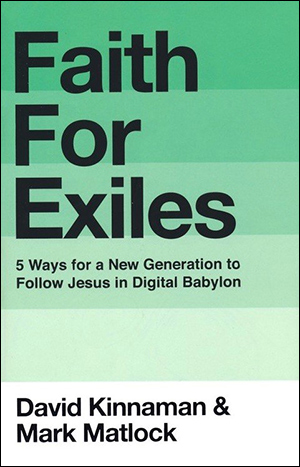Book Review: Faith for Exiles: 5 Ways for a New Generation to Follow Jesus in Digital Babylon by David Kinnaman and Mark Matlock

Faith for Exiles: 5 Ways for a New Generation to Follow Jesus in Digital Babylon (Amazon) by David Kinnaman and Mark Matlock. Baker Books, 2018. Total pages: 229.
In a world controlled by digital Babylon, faith is often repelled. Barna president David Kinnaman teamed up with former executive director of Youth Specialties Mark Matlock. They reflected this reality in the following statistics: Among today’s 18-29-year-olds, 22% are Prodigals (ex-Christians), 30% are Nomads (unchurched), 38% are Habitual Churchgoers, and only 10% can be considered Resilient Disciples. This shows the cultivation method of large crusades and mass baptisms adopted by churches in the 19th century no longer yields large results. However, the authors suggested that cultivating the right practices can grow resilient faith.
Those who are spiritual guides for the next generation must ask questions such as “Am I making faith more difficult for growing disciples?” And “Are our goals for the next generation more about how our kids make us feel than about what God is calling them to do and be?” And also “What role can I play to keep hope alive amidst the inexorable allure of the screen age?”
The authors contend that the goal of youth discipleship is to realize resilient, faithful young people who exude vibrant life in the spirit while living in spaces of cultural coercion. Parents, ministry leaders, and guardians must take a hands-on, soul-shaping approach to realize this deep, lasting connection between Jesus and young people (Millennials and Gen Z).
The authors presented results of a Barna study which identified five essential practices evident in the spiritual fiber of resilient young Christians. These characteristics are: 1. Experience Intimacy With Jesus; 2. Develop the Muscle of Cultural Engagement; 3. Forge Meaningful, Intergenerational Relationships; 4. Train for Vocational Discipleship; and 5. Engage in Countercultural Mission. These characteristics reveal more than mere concepts; these young disciples represent a hopeful future for the church.
How do we persuade young people to put their trust in Jesus? And how will they come to trust the church with its obvious brokenness? The authors suggested that parents, educators, and leaders should not just concentrate on pining for a Godly environment (getting back to Jerusalem), but focus on how to grow disciples even in a spiritually hostile place (Babylon). Cultivating faith for exiles means, by contrast, that we—young and old alike—trust that Jesus is Lord even in chaotic, pixelated, no-rules, digital Babylon. It is very possible to raise resilient disciples in digital Babylon. Just as the cyber world uses algorithms to shape identity, we should understand what is at stake as the cultural pull of individualism exerts tremendous pressure on today’s young Christians.
David and Mark zoomed in on youth identity. “Elective Identity”—the idea that people form their own distinctiveness based on their choice, should be reinforced by the Word of God which contends that our true identity is in what God thinks of us. One key example shared by the Barna study on Gen Z is that today’s teenagers are more fluid to the idea that gender is determined by how we feel, not by birth gender.
Instead of offering a “brand experience” of Jesus (living your truth, achieving your dreams, or “you doing you”), the church must facilitate a transformational experience for youth to find their identity in Christ even while exiled in digital Babylon. Consider the youthful examples of Biblical characters such as Daniel, Shadrach, Meshach and Abednego. How does the church orient its compass away from a “Brand Jesus” orientation? By asking the big questions such as questions of identity, lifestyle, intimacy and relationships, meaning and purpose, as well as legacy and significance.
The authors posited that resilient faith transmission is greatly influenced by households with vibrant faith. Certainly this is not automatic, as the gravitational pull of digital Babylon is stronger than just a memory of Jerusalem. Whenever Christians capitulate to the minutest of cultural norms, the next generation will be left immunodeficient and stagnant. The need is strong to articulate a countercultural Biblical morality.
The authors believe that the church should prepare its youth not only how to think, but how to live within this pluralistic society. Don’t just engage; prepare to engage. They termed this “cultural discernment.” The authors cautioned pastors that preaching good sermons alone will not bring about whole-life transformation in exiles. Consequently, “Churches should have structured learning through courses, programs, mentoring, field-based experiences, mission trips and more,” in order to capture smart, connected, and curious minds.
I wish more would have been written regarding essential practices of developing resilient faith. With its focus on the meager 10% who they label “Resilient Disciples,” there is little guidance for how to relate to the remaining 90% for whom the Gospel also promises to be “Good News.”
I found the chapter on forging intergenerational relationships central for the thesis of the book. Young people will not have to stray to find supportive relationships when churches intentionally develop meaningful intergenerational faith communities. For example, responding to the statement “When growing up, I had close personal friends who were adults from my church, parish, or faith community,” only 27% of prodigals strongly agreed in contrast to 77% of those with resilient faith. Strong relational bonds within the church means relationships among all generations, not just one generation.
After reading several other books along the same theme, this book stands as an exceptional addition to form a library about intergenerational ministry and faith transmission. It is deeply pedagogic with its charts, statistics, and testimonies, with Biblically grounding.
I think ministry leaders, pastors, and concerned parents who have been struggling to understand and connect with Millennials and Gen Z will find Faith for Exiles to be a wellspring of help. The co-authors contrast and compare the practices, beliefs, perspectives and attitude of the 10% resilient disciples with those of prodigals, nomads, dropouts, and habitual churchgoers.
 |
Larry Green, MDiv, pastor of the Bethel and Adelaide SDA Churches in the Bahamas. |